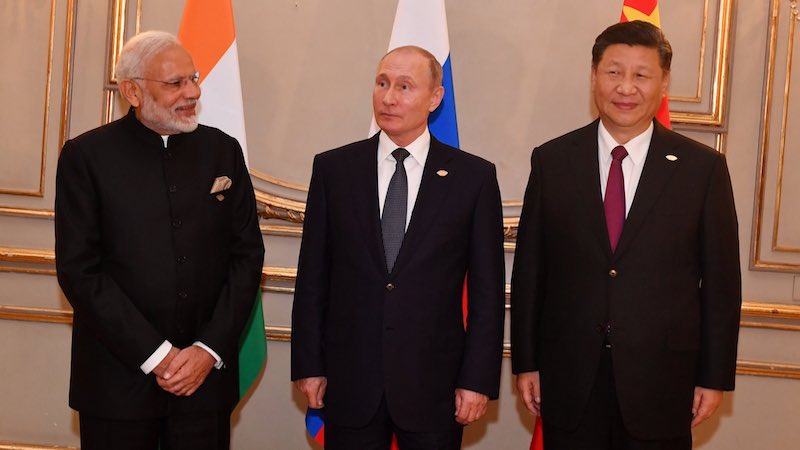
By C Raja Mohan
The summit meeting between Russian President Vladimir Putin and Chinese leader Xi Jinping in mid-May 2024 in Beijing underlines the growing convergence of strategic interests between two of the world’s most consequential nations in countering the West. The sweeping agenda of bilateral cooperation, from financial to technological and collaboration on regional security-from Ukraine to North Korea outlined by the two leaders demands that Delhi carefully recalibrate its own great power relations and compensate where ever necessary to blunt the negative consequences of the Sino-Russian entente.
Since he took charge of Russia in 2000, Putin has made a sustained effort to expand ties with China even as he explored a modus vivendi with the West. At the turn of the 2000s, a rising China was intensifying interdependence with the United States (US) and Europe, but Beijing found it useful to develop strong ties with Moscow to stabilise its frontiers and strengthen global multipolarity. Since his ascent to the top in 2012, Xi Jinping has sought to reduce dependence on the US, chip away at American US primacy in Asia and double down on a strong partnership with Russia.
As their contradictions with the US began to deepen over the last decade, both Putin and Xi have elevated their bilateral collaboration into a ‘Comprehensive Strategic Partnership of Coordination for a New Era’ in 2019 and professed a high degree of mutual trust. On the eve of his invasion of Ukraine in February 2022, Putin travelled to Beijing to proclaim an “alliance without limits”. Since then, Putin and Xi have surprised Western observers who had been arguing that Russia and China cannot get too close to each other, given the range of their competing regional geopolitical interests and the intensity of their stakes in economic engagement with the West.
It is not that Putin and Xi do not have any differences. As two major powers in a shared neighbourhood with a record of intense bilateral conflict, the interests of Moscow and Beijing are not in absolute alignment. Yet, Putin and Xi have shown that they can put their divergences aside in building a new alliance to resist Western dominance over world affairs.
The latest summit has highlighted their efforts at political coordination and mutual support on their respective national priorities – Ukraine for Russia and Taiwan for China. Putin and Xi also denounced the US’ interventions in Europe and its effort to build new coalitions like the Quadrilateral Security Forum (in which India is a member, including Australia, Japan and the US). They also underlined their commitment to build a ‘multipolar world’ and weaken American global hegemony over international institutions, especially in the domain of finance. If the US has been pressing China to limit his cooperation with Russia, the usually wooden Xi seemed to thumb his nose against Washington with a rare hug for Putin.
New Delhi, like many Western chancelleries, had been betting on the thesis that Moscow and Beijing could not collaborate beyond a point. In a corollary to this thesis, Delhi has been hoping that Putin will not ignore India’s concerns in drawing too close to China that has emerged as India’s principal external challenge. The time has come for Delhi to reexamine its Russia thesis and its corollary as the Sino-Russian partnership goes from strength to strength.
India’s former Army Chief, General M M Naravane, put India’s concerns succinctly, “The closer alignment between Moscow and Beijing could potentially embolden the latter in its assertive actions in the region – including territorial disputes with India along the Himalayan border. Russia’s tacit support or neutrality in such conflicts could complicate India’s strategic calculus and necessitate a reassessment of its foreign policy priorities. Given a no-limits partnership and the premise that China is undoubtedly supporting the Russian war effort, India can no longer assume Russia’s support in reining-in China in the event of a clash.”
Beyond the question of border security, Delhi has reasons to worry that Putin’s support for China’s positions in the Indo-Pacific would undermine India’s effort to build a balanced regional order in Asia. In the aftermath of the Cold War in the 1990s, India had joined hands with Russia and China in promoting a ‘multipolar world’. However, as India’s conflict with China deepened in recent years, Delhi has underlined the importance of a preventing Chinese dominance over Asia. Moscow’s growing regional security cooperation with Beijing would make India’s quest for a multipolar Asia that much more challenging.
The Sino-Russian partnership might also reduce the Indian compulsions to avoid too tight a strategic embrace with the US. During the Cold War, India turned to Russia to balance China and blunt the Sino-US entente in Asia. Delhi may no longer hope to get that kind of strategic depth from the Russian partnership. Although Moscow understands India’s difficulties with China and would want to sustain the traditional bonds with Delhi, Russia is likely to be constrained by the logic of its confrontation with the West.
Moscow believes that the “collective West” poses an extraordinary threat to Russian interests and the alignment with China is critical in addressing it. For India, the principal contradiction is with China; the US and its allies are seen as part of the solution in Delhi. This structural contradiction between the Russian and Indian security imperatives will not be easy to finesse, as the conflict between the West and Sino-Russian entente escalates.
- About the author: Professor C Raja Mohan is a Visiting Research Professor at the Institute of South Asian Studies (ISAS), an autonomous research institute at the National University of Singapore
- Source: This article was published by Institute of South Asian Studies (ISAS)
